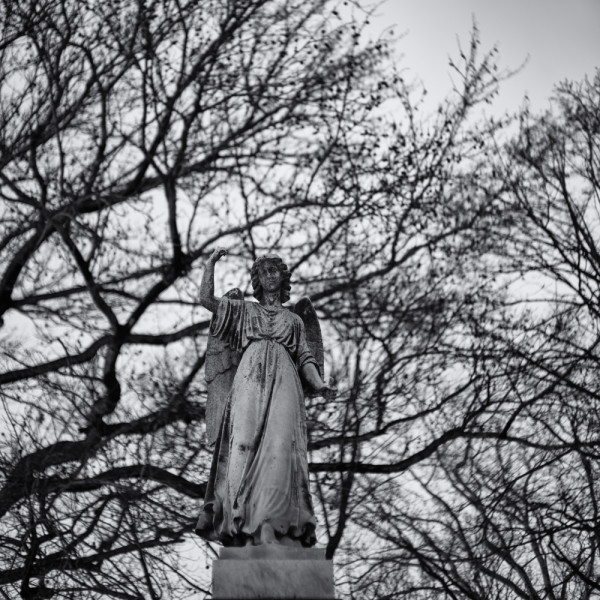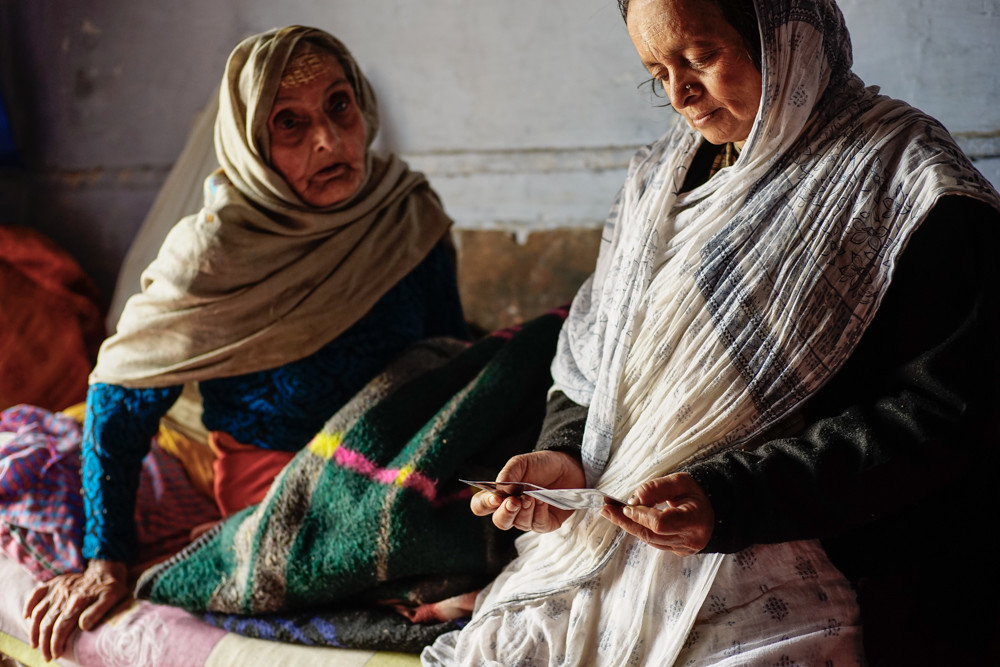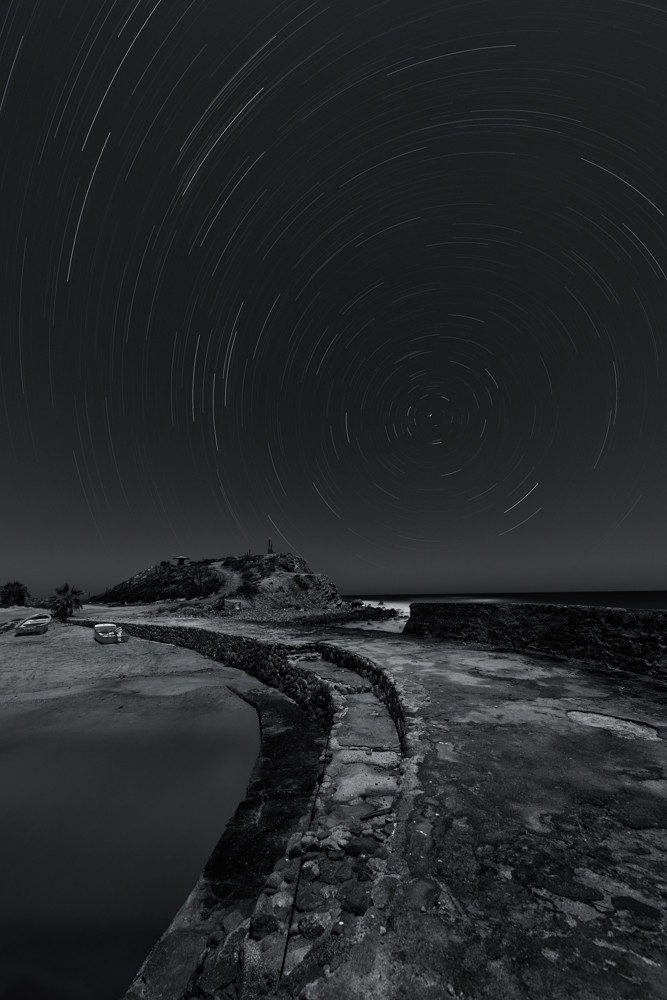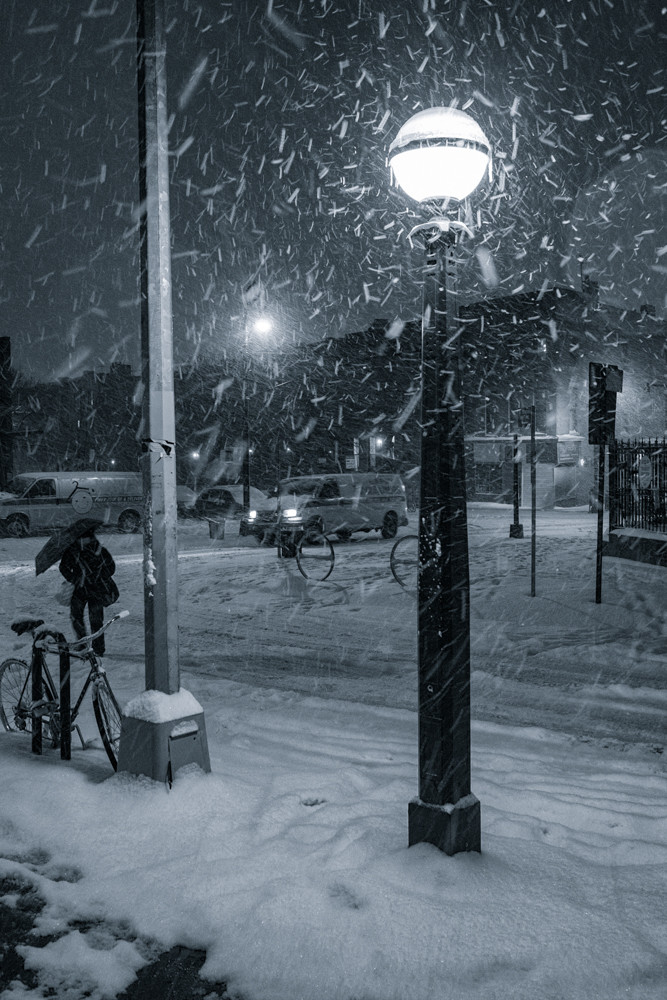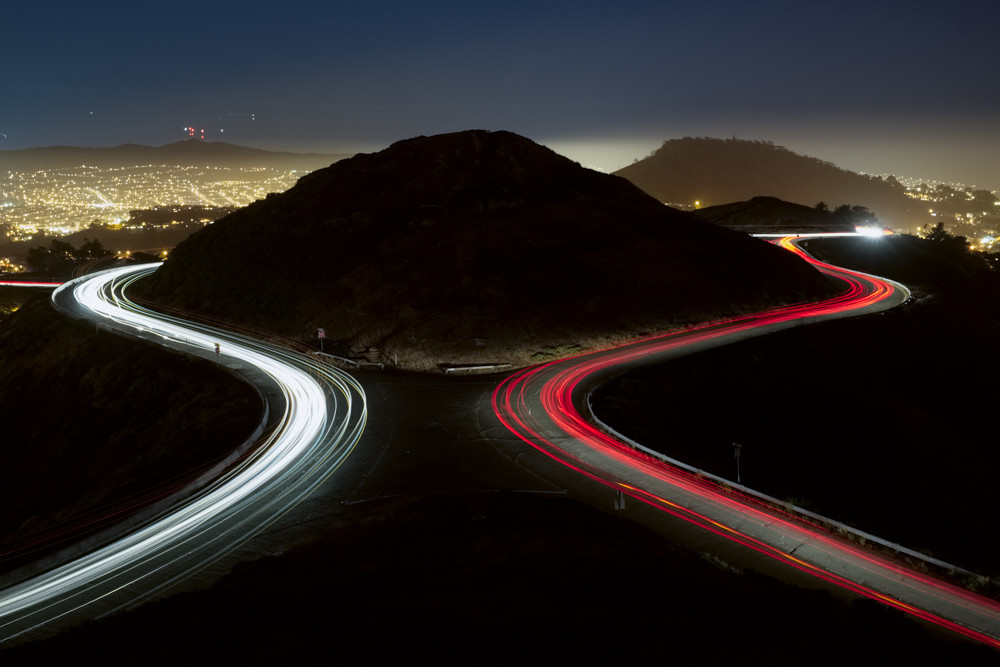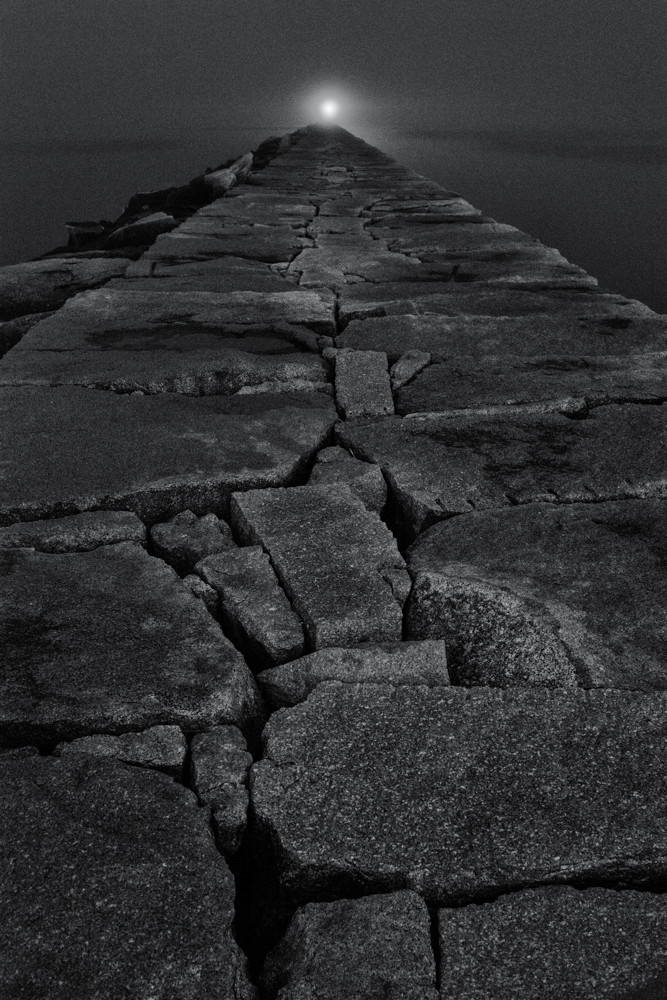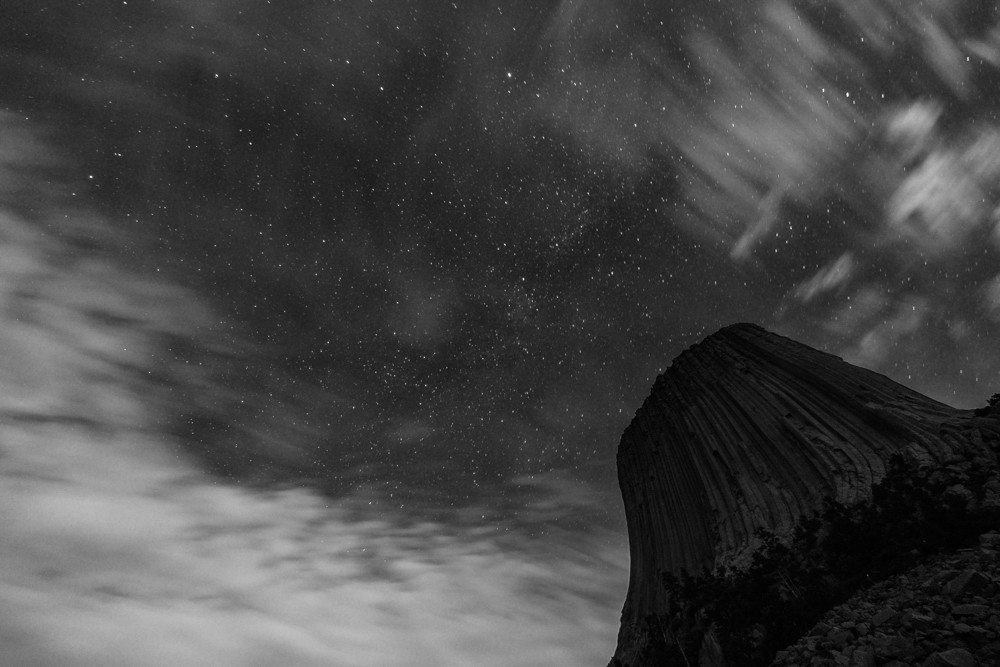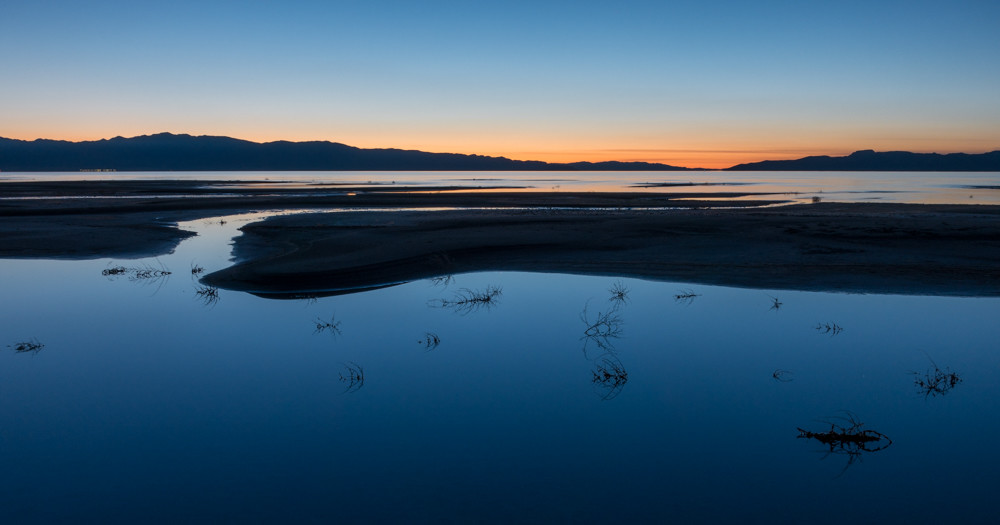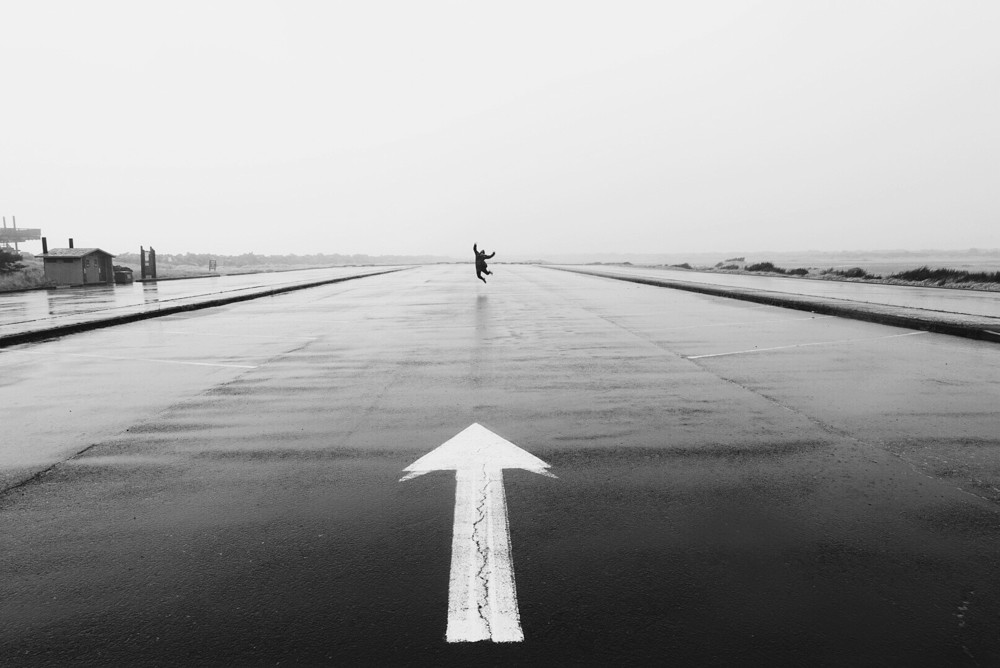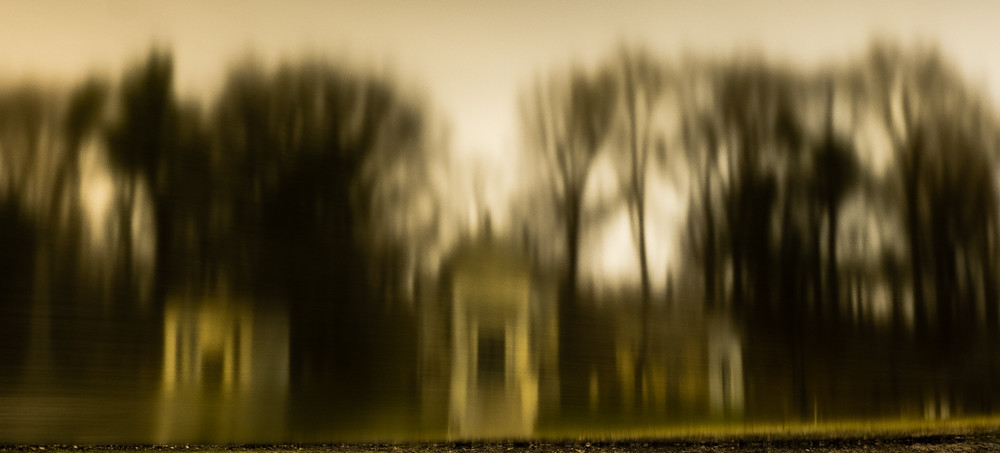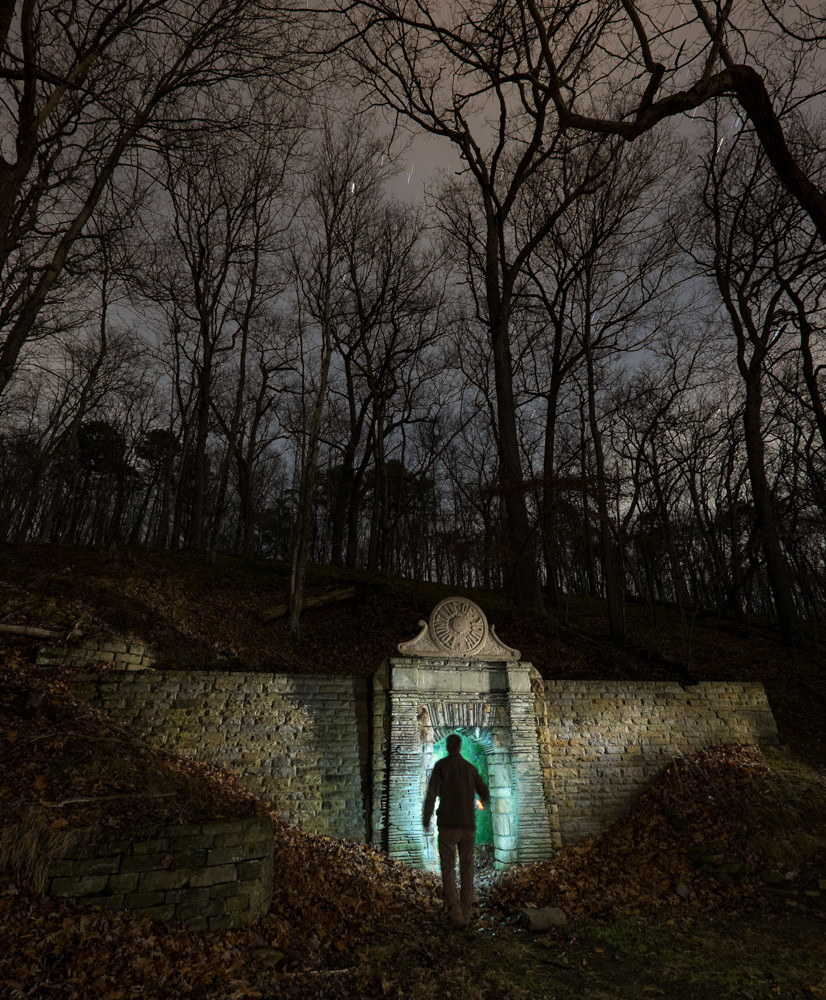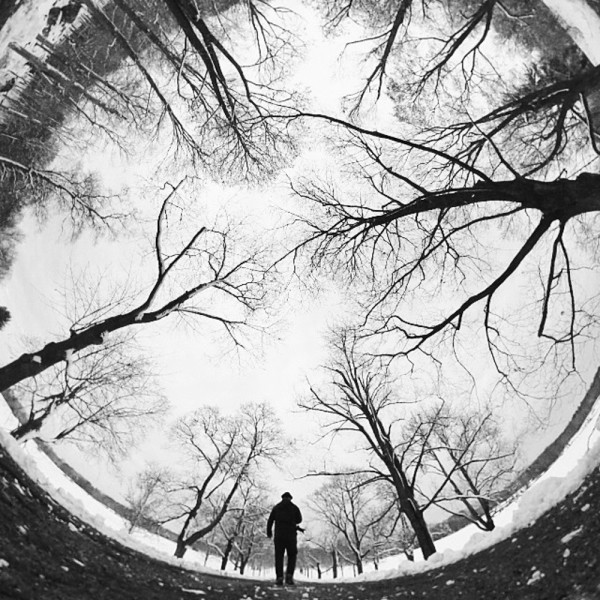| I’m thrilled to finally share some of my favorite shots from my Finland workshop with PhotoQuest Adventures. When the founders of PQA, Mirjam and Najat, approached me about leading a Northern Lights workshop to the Lapland region of Finland, it took me about .0001 seconds to say “YES!” Located in the Artic Circle, the Laplands are comprised of the Scandinavian countries of Norway, Sweden, and Finland, and offer about 200+ nights of excellent aurora viewing.
We chose to go in March, because during the equinoxes, the tilt of the Earth’s magnetic field opens a wider window at the North and South Poles. The solar wind carries the ejected electromagnetic particles from the sun, and if they enter these “windows”, they will mix and interact with the many particles in our magnetosphere and create auroras. As most of you know, I am a road warrior. To say that I travel a lot is a bit of an understatement. Yet, this flight was extraordinary – I was in total awe flying into Tromsø, Finland. The spectacular scenery – snow covered and mountainous islands and fjord cutting rivers made me feel like I was truly entering the Land of the Giants. |
||
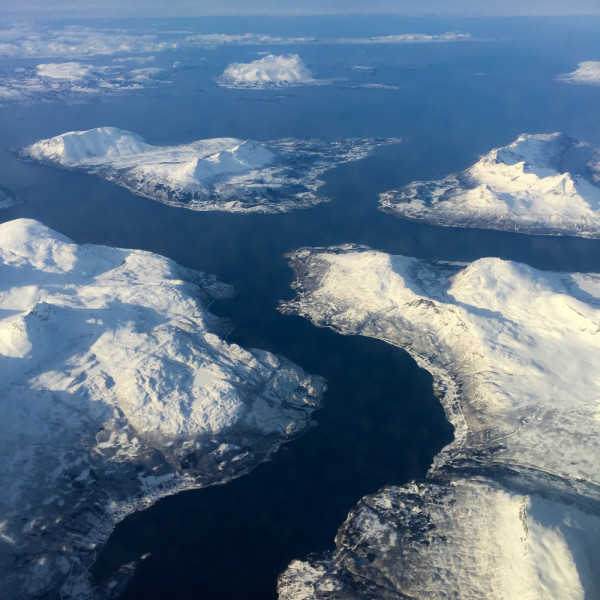 |
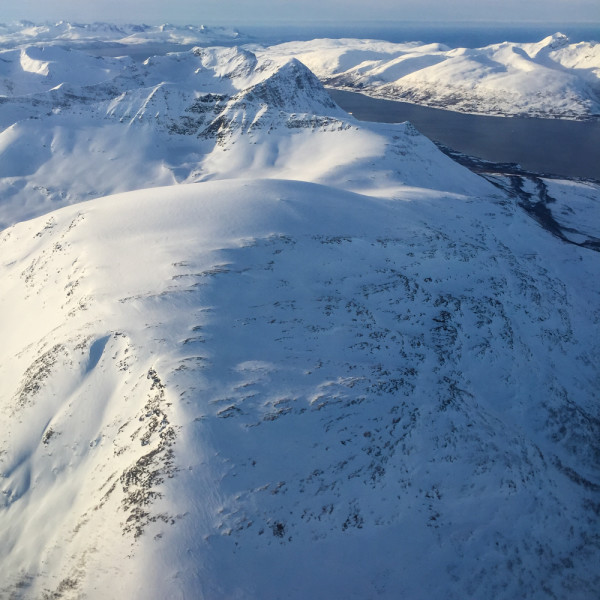 |
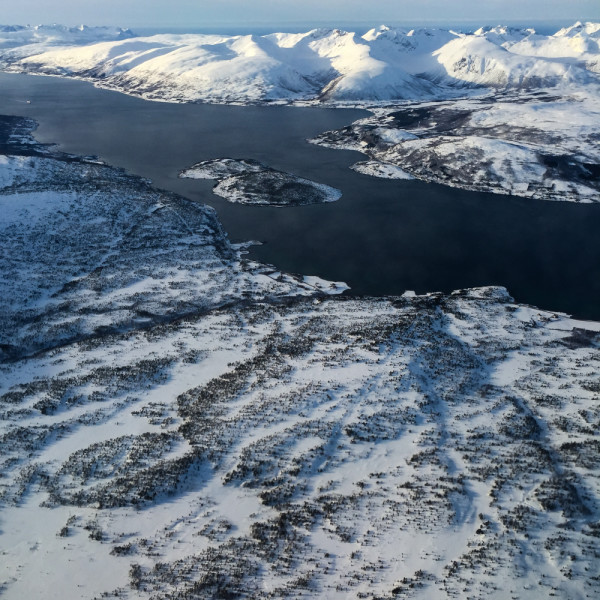 |
| For the next 5 days we would base our operations out of one of the region’s largest villages, Kilpisjärvi, which maxed out at a population of 150. Our fearless guide, ironically a Kiwi, Gareth, fell in love and married into the Finnish Lapland region several years ago. The first matter of business was to outfit us with the proper winter-wear. Average temperatures this time of year were 0-20F at night and about 20-40F during the day. PQA made packing our bags much easier by organizing winter clothes to rent for the entirety of the workshop. Local tour guide, Jussi (sounds like Yussi), got us outfitted in the warmest clothes – hats, gloves, snowsuit, wool socks, and wool lined boots. I brought some REI warm weather gear but it didn’t hold a candle to the rental gear that we had. I have to say, that as long as we wore those clothes, we never felt the cold.Properly dressed, we jumped into a sled (pulled by a snow mobile) across the frozen lakes boarding Finland and Sweden to visit the reindeer! My popular daytime camera ended up being the 360-degree Ricoh Theta point and shoot camera. The three images below show the unique and otherworldly views that you can create with this $300 camera. The Theta has a lens on both sides of its simple body and you will capture everything except what’s underneath it. The first two images show the “Little Prince” like tiny planets that you can create when you hold the camera up high. For the third image, I placed the camera on the ground and then triggered it remotely with my phone as soon as the white reindeer got into the perfect position. The Ricoh creates a unique 360 interactive viewing that you can see here. However I like to manipulate the image on the phone and then take a screen shot and share. The screen shots are obviously a low-resolution quality, but as of right now this is the only option to “freeze” or print and image taken with the Theta. | ||
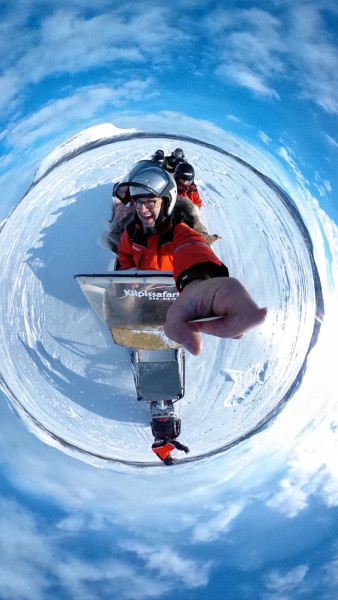 |
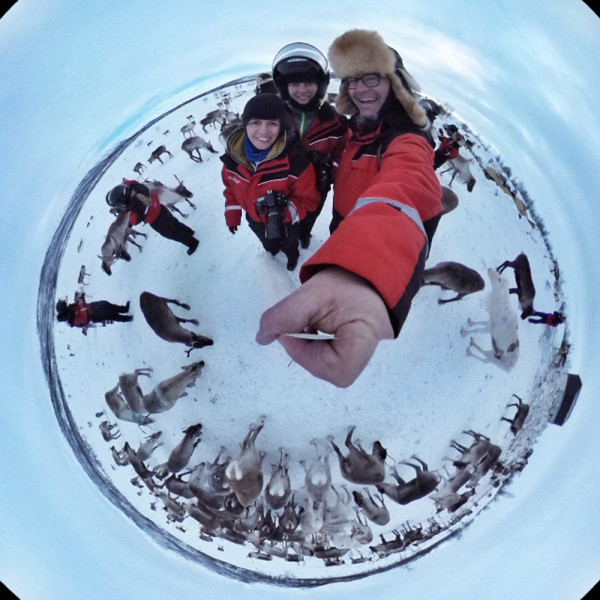 |
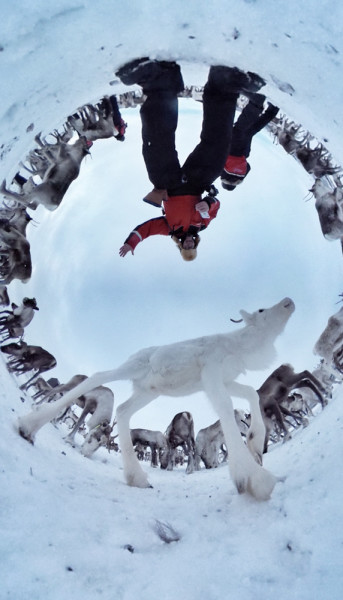 |
| That night we experienced the Northern Lights for the first time – we were all very excited and got some great shots. However, out of the 1800 photographs I took during our workshop, the first nights just missed the final cut.Now typically when I teach a night photography workshop, we don’t meet until 11am-12pm the next day. Unlike any workshop I have experienced, PQA emphasizes the total adventure, and there is no time to waste! The second day’s exploits were to include dogsledding and a night in a glass igloo! I’ve always dreamed of leading a pack of Artic dogs across the snowscapes and let me tell you it is no easy feat! There were over 150 dogs on the Husky Farm, and each one of us were divided into two-team sleds with 7 dogs. After a quick lesson on how to apply the braks and to Never Let Go – we were off! Man those dogs like to drive! We were led through curving paths, fell birch forests, and over frozen lakes – breaking and barking all the way! Our destination was a warm hut or kota, about 45 minute later, where we were able to warm up with a wooden cup full or comforting cocoa.The ride back was a bit hairier; the snow had picked up making visibility and the path hard to follow. My glasses were turning into pinholes and I’ll admit that I fell once or twice, but never let go! With the help of our wonderful team, I got back in the saddle and Onward Ho! It was truly a wonderful adventure and I look forward to playing Yukon Cornelius on our next visit! | ||
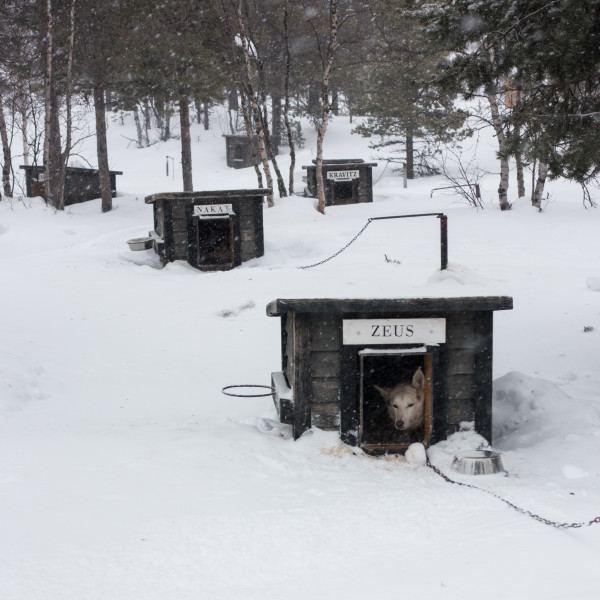 |
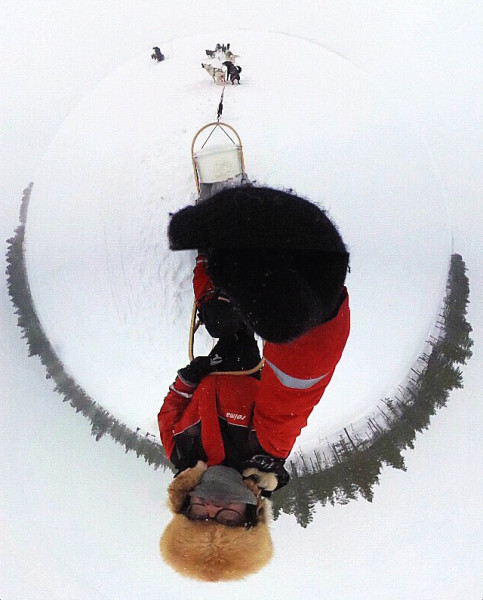 |
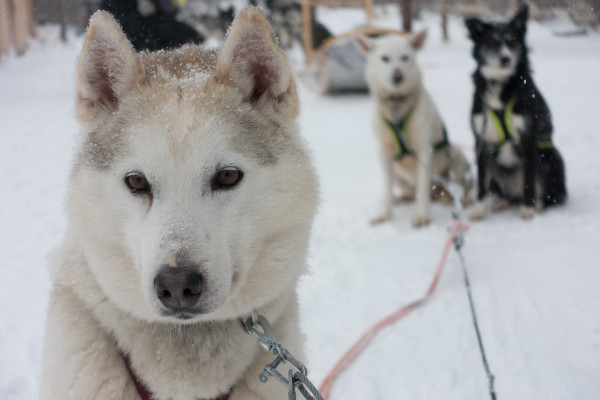 |
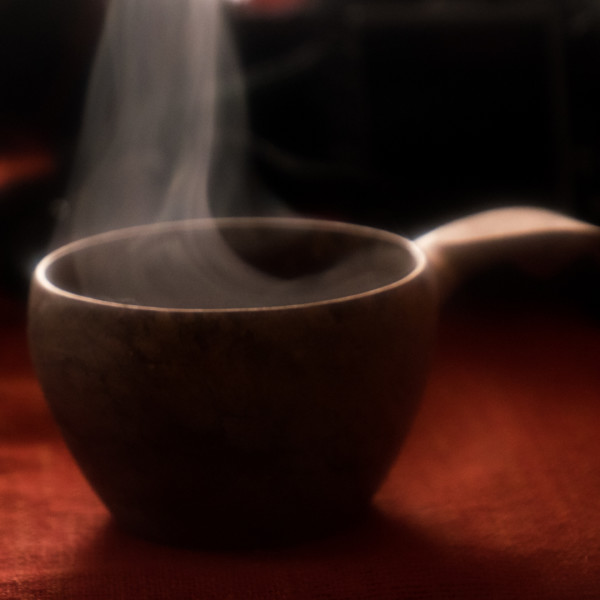 |
||
| The night at the Glass Igloos was magical. No, they were not made of ice, but they did offer amazing panoramic views from the top of a mountain. We enjoyed a wonderful home cooked meal in the Kota and were introduced to the popular PQA game of LCR, as we waited for the auroras to appear. They auroras typically started to show themselves from 9pm-11pm and then again around 1am. Some were incredibly vivid and seem to melt the whole sky. Others are barely visible to the naked eye; they look more or less like milky, curiously shaped clouds. However, our cameras can “see” a wider range of colors than our eyes, and when we pointed our cameras skyward, we would start to see these subtle auroras dancing above us. The auroras can get as close as 60-120 miles from the earth’s surface. The shot on the right was the first lightening bolt from the green fairy that we witnessed, and it turned and twisted its away across the sky for a good 30 minutes. The image on the left was probably the most spectacular aurora I experienced. It was so huge and seemed to engulf the whole sky as it plummeted towards us, but at the last minute, it turned up and onto itself in an amazing fashion. The middle shot is later in the night and a bit more of a subtle aurora over my igloo. I tried to go to bed at 3am, but the northern lights were still playing in the sky! So I put up my tripod at the head of my bed, pointed upward, and set the camera to take a shot at an interval of every 30 seconds. I’ll hopefully have a time-lapse of that to share with you in a later post. | ||
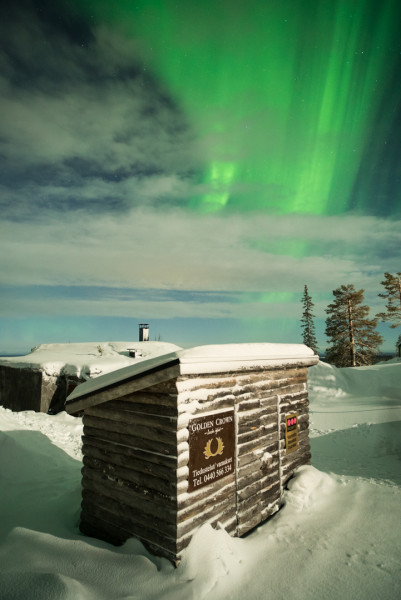 |
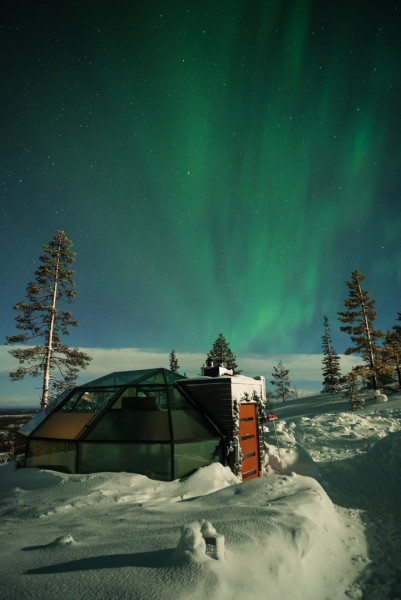 |
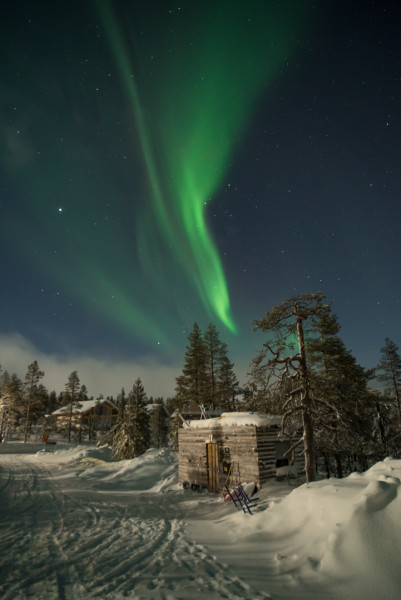 |
| The next night Jussi and Gareth drove our sleds towards the mountain called Saana, looming over our hometown of Kilpisjärvi. The weather was not very cooperative, it seems like the giants were battling. We had a 1-hour window of aurora viewing before the clouds rolled in. So, we gathered in the warm kota and listened to the tale of how Saana came to be. According to the legend of the giants, Sullen Saana fell madly in love with the beautiful Malla. On their wedding day, the jealous Pältsä asked the evil and elderly women of the Lapland to help him release the northern winds upon the ceremony. The cold winds created a storm of epic proportions and froze everyone where they were. Saana and lovely Malla ran and tried to escape, but the winds were fierce. At the last moment, Saana rushed the lovely Malla to her mother, Big Malla and where those giants froze, they now became treeless mountains or fells. The tears of lovely Malla formed the Kilpisjärvi lake and the jealous Pältsä also became a frozen mountain in what is now Sweden.Inspired by this story and itching to shoot, several of us went back outside. The clouds were still hiding any auroras, but we had fun light writing and ripping some aurora-less nocturnal exposures. | ||
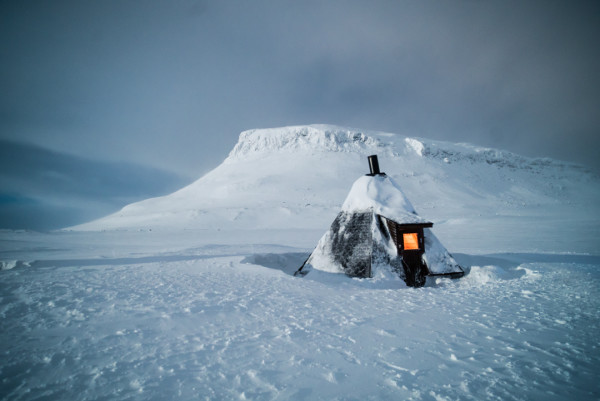 |
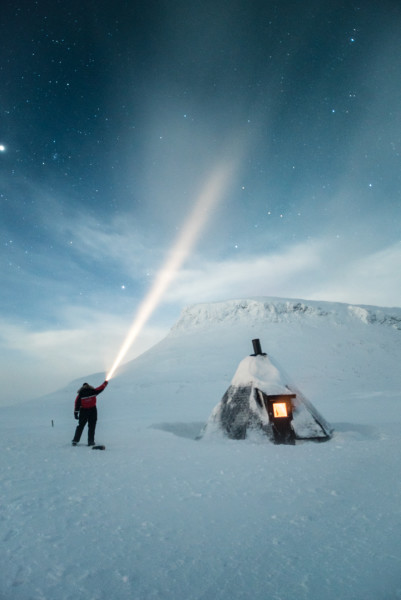 |
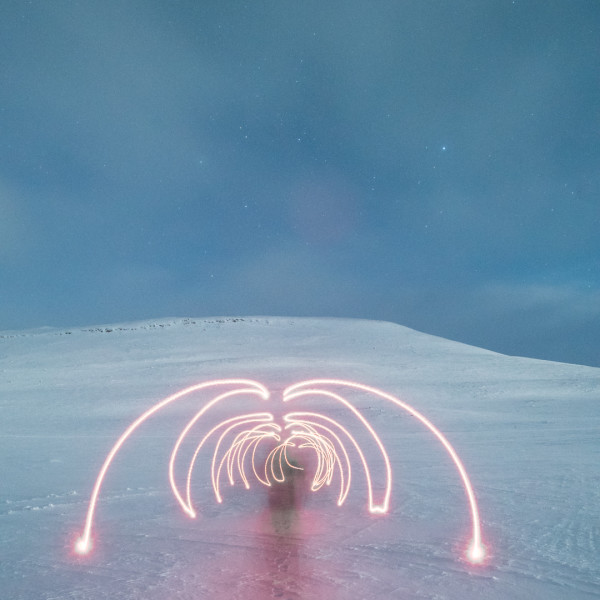 |
| On our way back to our cabin, we passed a pristine, snow covered, and “just out of a fairy tale” cottage. I had to shoot it. I set up the tripod low to emphasize the animal footpath on the left. This is one of those images where the bright lights on the door and the low ambient light created a dynamic range too high to capture in one shot. I took several pictures, careful not to move the tripod, as I knew I would need to blend them together as a composite or HDR image later. The final shot ended up being a composite of 2 images one taken for the shadows, a 60 second exposure and blended with one retaining the highlights 3 stops under. This helped saved the highlight detail of where the two lights were spilling on the snow and house. | ||
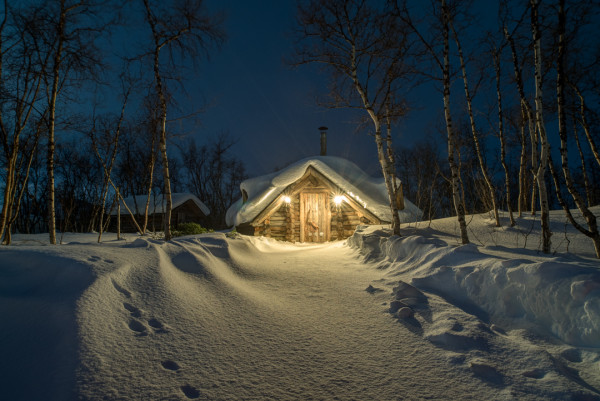 |
||
| Finland Fashion is trending! There wasn’t much time for shopping but Gareth did take us to one of the biggest and family owned gift shops. You could find everything from gnomes and trolls to the popular 3D magnets and pictures and lots of winter wear and donuts in between. I really wanted to bring back an authentic sweater and when I tried on the one from our Sweater Gang shot below I knew it was a hit. I guess I inspired 4 more from our group, and one (Allison) who now regrets not joining our posse! The hanging snowsuit and wool lined boots show off a bit of the warm clothes that we rented and kept us super cozy – though they took about 10 minutes to layer everything on! I typically wore a wicking long underwear base layer, then a 2nd layer of jeans and a REI thin puff jacket, before finally jumping into the snowsuit outer shell. The third shot shows the group in full regalia | ||
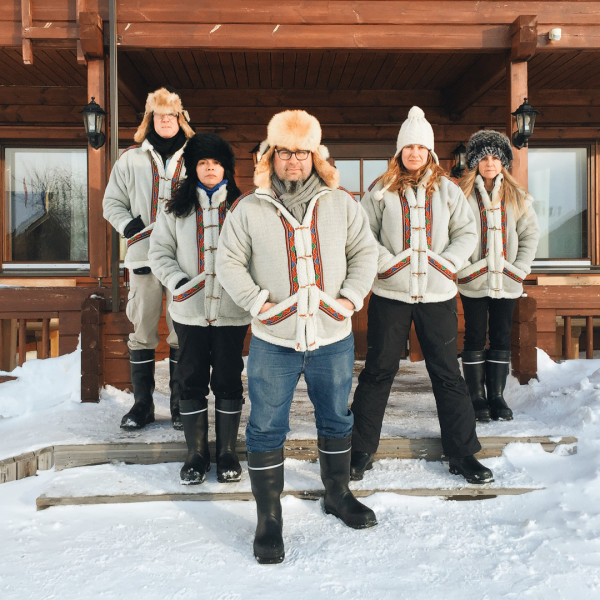 |
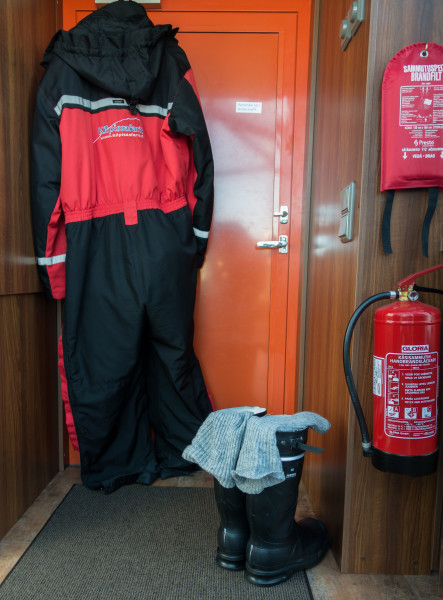 |
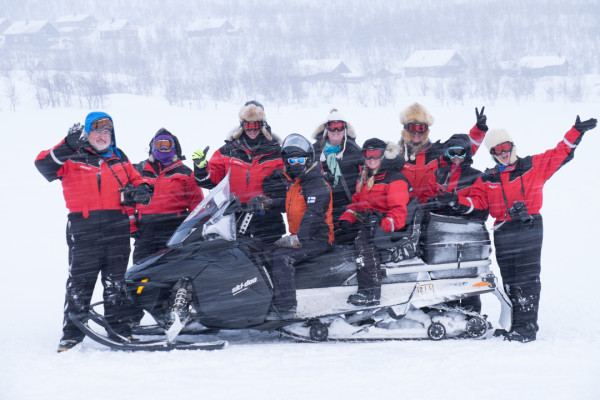 |
| The last day was a bit blustery and I decided to put the weather sealed Fujifilm XT1 and 18-135 lens to the test. You can see a fun picture of all the gear I brought with on Instagram. I typically rolled with the Fuji during the day and the Sony A7s with the Zeiss 21mm 2.8 lens, and metabones adapter at night. If you have gear that can shoot successfully in inclement weather, it opens up some pretty amazing shooting opportunities. I love the high key abstract studies of the buried birch fell trees that I was able to create during the height of the snowstorm. Both were shot at 1/60 of a second but if you look closely you can see the snow movement against the black trees, which gives it a very brushed and painterly feel. I converted the images on the right and left to B&W but loved the warm wooden colors of the Kota against the cool blue snowscape in the middle photograph. And the Fuji XT1 and 18-135 lens? They survived like champs for over 2 hours in the storm. | ||
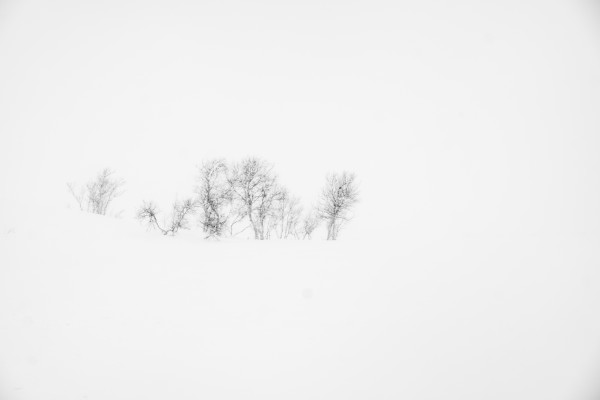 |
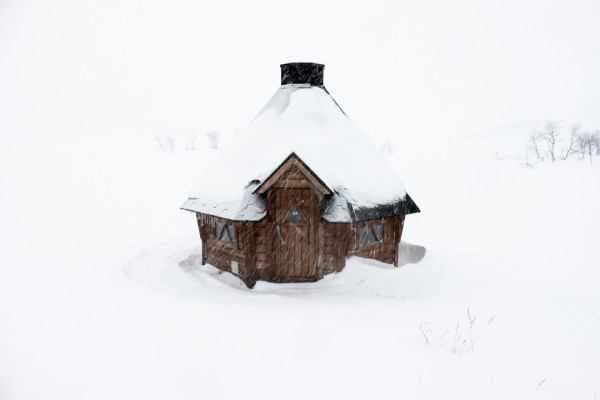 |
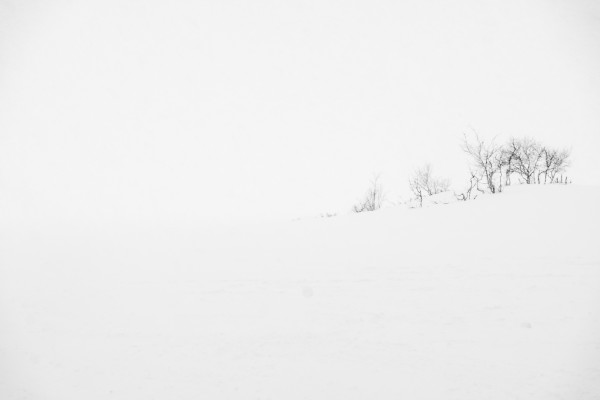 |
| The storm continued until the early evening and it looked like we had seen the last of the auroras. We had a hearty final supper and reminisced on the many adventures we had experienced over the last 5 days. However, it looks like the giants were going to grant us one last wish – when we left the restaurant, the skies had mysteriously become clear and full of stars. And about an hour later the green fairies lit up the sky for a wonderful last night of shooting. | ||
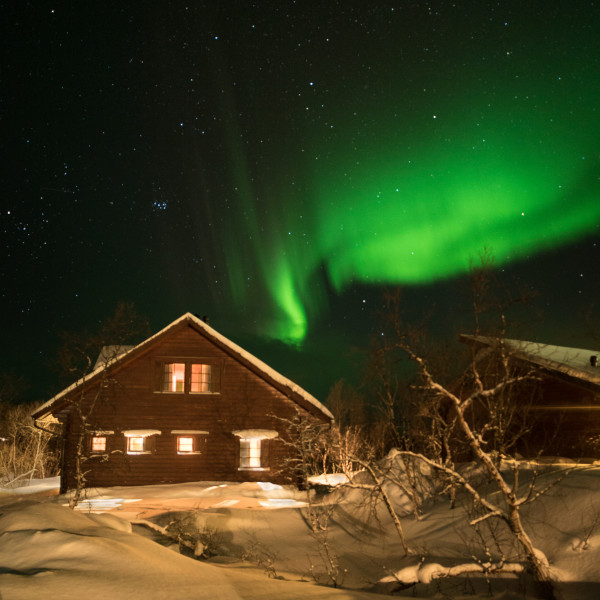 |
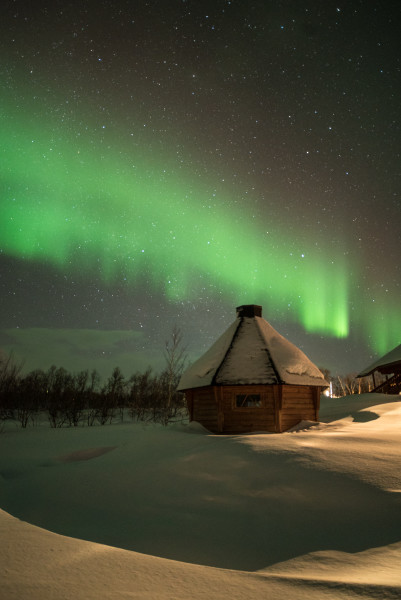 |
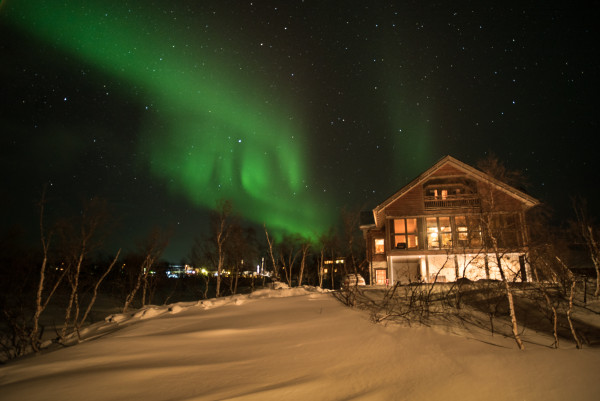 |
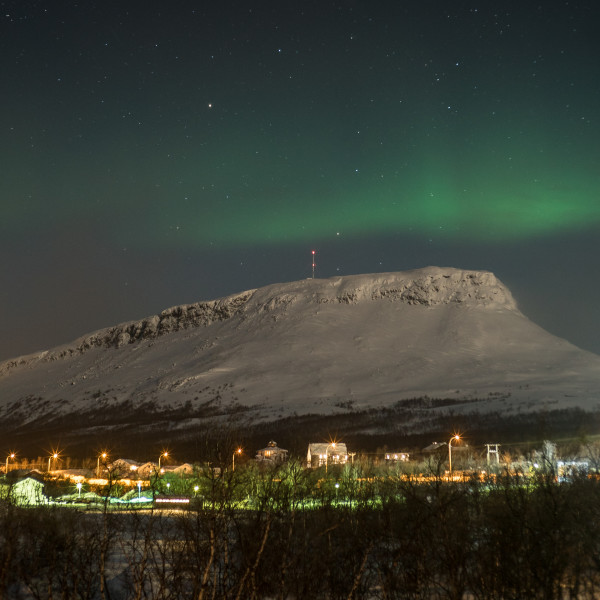 |
||
Gabe’s tips for shooting the Northern Lights:
http://www.swpc.noaa.gov/products/30-minute-aurora-forecast https://itunes.apple.com/us/app/aurora-forecast./id539875792?mt=8
CARPE AURORAS! |
||
Tag: Night
Green-Wood Cemetery Night Photography Workshop now Open for Registration
Posted on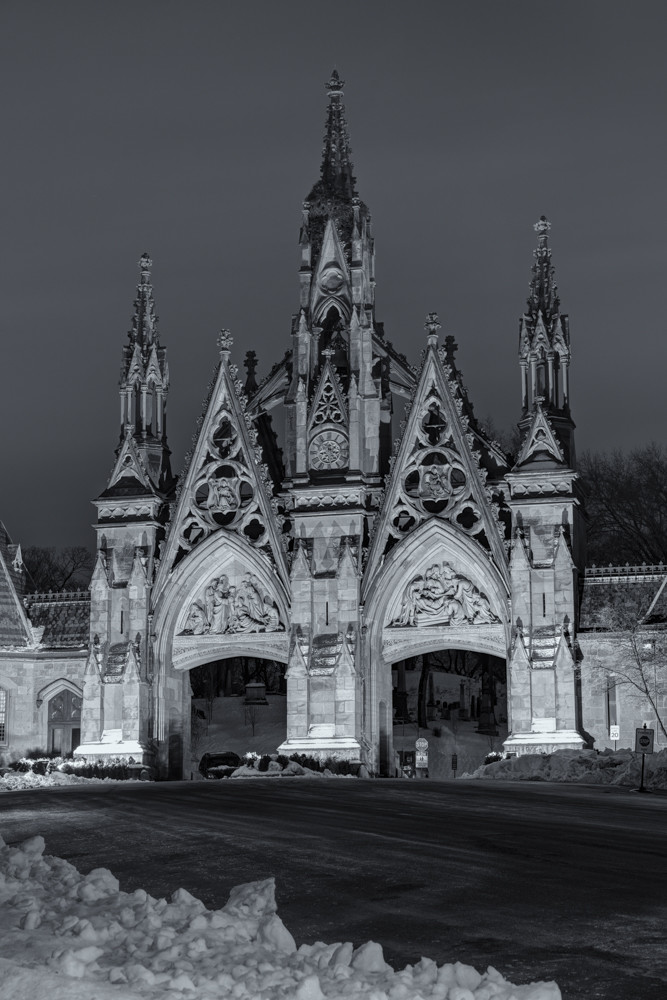
The year is 1853 – can you guess what the 2nd greatest tourist attraction is in the United States, after Niagara Falls? This was the time before the Central and Prospect parks and Green-Wood Cemetery, one of the finest examples of a rural cemetery, would easily have over 500,000 visitors a year.
Built in 1838 and designated a National Historic Landmark in 2006, what inspired people to visit remains the same: the 478 acres of hills, valleys, glacial ponds, and pathways which meander through one of the finest collections of 19th and 20th century statuary and mausoleums. It is this rural landscaping that separates Green-Wood from the other famous cemeteries of New York City.
It is also steeped in rich history – Battle Hill is the tallest point in Brooklyn, rising 200ft above sea level. You’ll find the goddess Minerva up there, standing tall and looking out to the Statue of Liberty. The famous Battle of Brooklyn was fought in 1776 across from what is now Green-Wood.
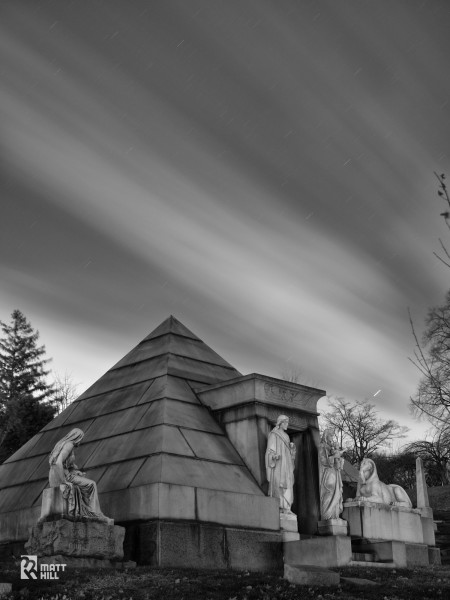 |
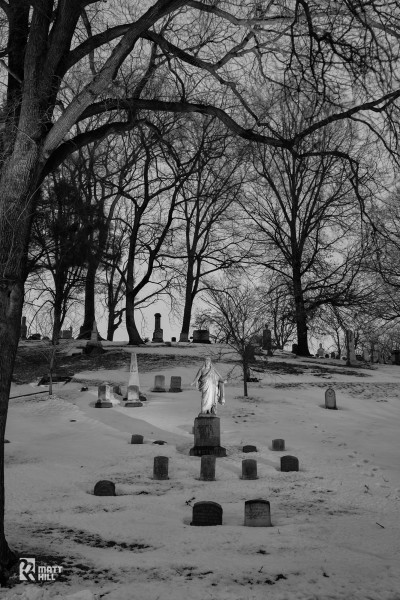 |
|
For the first time, the grand gates of Green-Wood will be open for an exclusive night photography workshop. Photographers Gabriel Biderman, author of Night Photography: From Snapshots to Great Shots, and visual artist and educator Matt Hill will lead you on this hands-on photography workshop dedicated to capturing the essence of Green-Wood at night. Long exposures and light painting will be the focus so a tripod, cable release, and SLR camera are mandatory. A comfort in shooting in manual and bulb mode is also recommended. Gabe and Matt have been teaching workshops in historic NY locations like Sleepy Hollow, Woodlawn Cemetery, and Bannerman Castle, and pride themselves on their personal approach to sharing their night photography visions with their students. There will be ample lecture, shooting, and touring time so that you will end up with a better understanding of night photography and Green-Wood. You can attend this 2-night weekend workshop for either 1 or both days depending on your schedule. If you take both nights, you will be able to get feedback on your work at the critique on Sunday. We also feel that by shooting on consecutive nights you will become more proficient with your night photography skills, as well as a better opportunity to explore more of this amazing location!
DATE: APRIL 25th-26th
TIME: 4pm-12AM each night
WHERE: GREEN-WOOD CEMETERY MAIN ENTRANCE ON 5TH AVE
PRICE: $150 Per night – to register click here
Required Gear: DSLR camera, tripod, and cable release. A full gear guide will be sent to you upon registration.
My favorite photos from 2014
Posted on — 13 CommentsTis the season to reflect back upon the year – your accomplishments, adventures, failures, and of course, pick yourself up and get ready to steamroll into another year.
Last year I took 29,521 pictures. I have yet to do a “hard” edit on several shoots and could probably delete a bunch more. A few thousand also fit in the timelapse category – which I am still searching for the best software to create these little flipbooks. However you compare that to the 49, 217 in 2013 and 35,964 in 2012 and you can say I either wasn’t as prolific or I was more focused. How many photos did you take this year? Are you still working on them or are you ready to move onto the new 2015 folder?
One of my regrets for 2014 was that I didn’t blog and share my work as well as I could have. The book seemed to have drained me of any new words and I was busy now celebrating it and taking it on the road to various lectures, workshops, and travels. That was definitely a ton of fun and I enjoyed receiving lots of emails and feedback from all the people that I had shared my night visions with in 2014. I love teaching workshops; the moment when a student gets that “A-ha” is just as thrilling to me as it is for them. I was fortunate enough to have the workshop scene take me to some pretty fabulous places from Baja-Vegas-Zion-Bannerman-Missoula-Maine-Woodstock and Woodlawn. But it was just as important to plan some personal shoots where I could act the role of the student and explore new locations and challenge time and composition.
2015 looks to be another banner year with trips to Finland, Iceland, and Galapagos in the works. But without further ado – here are my 13 favorite images that I created in 2014.
January 1st 2014 was probably one of the most soulful days that I have ever experienced. I was in the spiritual capital of India, Varanasi, with my Dad, my Indian sister Sujata, and a couple other friends. We had been given an amazing opportunity to visit several ashrams – safe spiritual houses for widows. In the caste system of India, widows are the lowest of the low and will often not be taken in by family and are left to die.
The Sulabh International Social Service has taken a very proactive roll in housing and protecting these widows in Varanasi and Vrindavan. The image above was taken at the first ashram we visited. I had taken my Fujifilm Instax camera on this trip and it has never been put to such good use, as it was that day. As their stories were translated to us, I took instant portraits of them and let the magic of photography take over. You have to understand that many of these women are photographed but very few prints are sent to them. As soon as I took the Instax of the woman on the right, she grabbed my arm and took me to her mother’s room and woke her – so they could get their picture taken together. They are one of the few mother and daughters who have both lost their husbands but were lucky enough to find a safe place together.
A week after I returned from India, I was off to Sea of Cortez and Baja Mexico with Lindblad on one of their Land and Sea Photo Expeditions. I had taken a shot similar to this the year before but I wasn’t 100% thrilled with it. This image is 11 stacked 8-minute photographs. I love how the star trails create a complimentary half circle to the breakwater. I recently went back to this shot and converted it to black and white, which took it from a 3 to a 5 star in my book.
Boy, it snowed a lot last year! But I loved it – the challenge of taking on the elements and how they make us see the world in a different light. This is my subway entrance, a place I pass by 400+ times a year and I’ve never seen it look as magical as it did this night. I learned a long time ago to always have a camera on you. I stood at the entrance and fired off a burst of photos varying the shutter speeds from 1/4s to 1/15s to find just the right type of confetti snow.
Probably my favorite night image from 2014. This was a shot that had been percolating in my mind for a long time – the Night Island. I braced myself at the top of one of the twin peaks as the winds tried its best to knock my rig over. This is a single shot, twenty minutes, and pretty much exactly as I pre-visualized. It was great to check this image off my to do list and to create instead of capture.
Another location that was on my to shoot list was the Breakwater Lighthouse in Maine. I had visited this dramatic spot several times over the years and filed it away as a cool place to photograph at night. As luck would have it, the fog was in and I was able abstract the lighthouse to its essence – a beacon of light.
This year I was fortunate enough to work with the Maine Media Workshops and give a lecture on night photography as well as lead a bunch of students on their first night shoot. I was up there for a week and shot almost every night, which is a great challenge to put on your self. You get attuned to the different types of night-light and can feel the earth rotating around the stars. I was lucky enough to be up there for a new moon and witness the Milky Way just outside Camden. I set up this composition and as the few spotty clouds rolled in I knew it would make a great timelapse. It was also featured in Resource Magazine’s interactive digital version of their Fall 2014 issue
This was created on a scouting mission for an upcoming Devil’s Tower workshop that I will be teaching with Matt Hill through the Rocky Mountain School of Photography. Devil’s Tower is one of the best places to view the Milky Way and I only had one night that I could shoot it. The weather forecast was not good – overcast, but I continued my 10 hour drive through torrential storms, dramatic skies, and a rainbow or three. When I finally got to the tower – it seemed as if there was an invisible beam shooting upwards – pushing the clouds away from the top of the tower. I took advantage of this magical time and was rewarded with a few peaks of the milky stars in between some quickly moving clouds. It only lasted an hour or so before the blanket of clouds returned – it is said that this is a very spiritual place and it certainly answered my prayers.
I created this lightpainting/star trail combo as an example of what we can do with time during my night photography workshop at The Center for Photography at Woodstock this summer. I’m always looking for dramatic foreground to play against the star trails and this sculptured cabin was prime for the picking! I practiced the light painting at several angles and in the end it was the bounce light of a 80-lumen flashlight off the ground that produced the best light and shadows. The exposure was 18 stacked 4-minute exposures that created the 1 hour and 12 minute star trail.
I was taxed with the mission of pushing the Sony RX100III to the low light limits for a video that B&H made about the RX series of cameras with David Brommer and Alan Arkin. I own the V1 of this camera, that is often hailed as the best advanced point and shoot camera on the market. I’ve also always pooh-pooh’d P&S cameras for serious night photography. So I packed this camera and went out to push those pixels along on a trip to Salt Lake City. I was able to successfully get exposures up to 30 seconds with minimal loss of image quality. This was my favorite shot of the night – a 4 second shot making the most of the blue hour.
Here’s another story of overcoming the elements. When traveling to Portland, Oregon you gotta take some time to visit the coast. We only had 1 day to do it and the forecast was torrential rain the entire time. We could have easily just stayed in one of the many microbreweries in Portland – but we got our rain gear together and carried on! This was just one of those spontaneous shots that comes together. We were searching for a beach with a skeletal shipwreck but when we pulled into this parking lot and I saw the arrow I slammed on the breaks. We all got out and saw the composition – but Paige took it to the next level and ran out there and jumped!
I want to create not capture. I want to challenge the way I see and I want you to see my vision of this space. Deconstruct and let your mind wander.
Tom and I were shooting this hidden gem of a spot in Pittsburgh but it was missing something. I had been working the lightpainting on the outside and we knew we needed to add an element to the black hole of an entrance. I asked Tom to go inside and fire up a flash a few times to open it up. As Tom approached the entrance, and before the bat flew out, I knew that was the shot. By adding the human element, the mysterious explorer, I found just what the shot needed.
When creating, photography can be an amazing art form to explore your emotions. I gravitate to cameras or lenses that can help you see in a new way. I recently picked up this super simple and fun Theta camera, which captures the world in a 360-degree view. That’s a pretty outstanding starting point for vision and I have just begun to manipulate it and create these new worlds.
